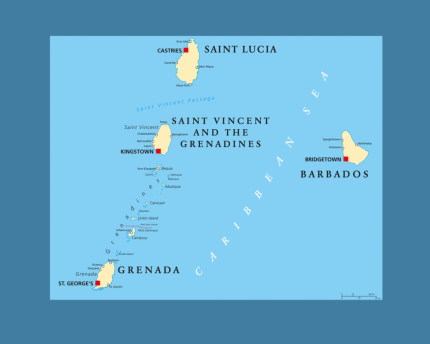
But while the military invasion is remembered as a success, the reasoning behind it remains the subject of debate. Here is the rundown, along with links for further study.
About Grenada: It is the most southerly of the Windward Islands in the Caribbean Sea. President Ronald Reagan summed it up this way: “The island is only twice the size of the District of Columbia, with a total population of about 110,000 people.”
In 1979, Prime Minister Maurice Bishop, described by Reagan as “a protege of Fidel Castro,” came to power in a military coup. “He [Bishop] sought the help of Cuba in building an airport, which he claimed was for tourist trade, but which looked suspiciously suitable for military aircraft, including Soviet-built long-range bombers,” Reagan said in an address on Oct. 27, 1983.
The buildup: Even so, Bishop “gave indications that he might like better relations with the United States," Reagan said. "He even made a trip to our country and met with senior officials of the White House and the State Department.”
Grenada’s deputy prime minister, along with the commander of the Grenadian armed forces, objected to Bishop’s interest in closer ties with the U.S., the BBC recounts. Bishop was put under house arrest in the second week of October 1983, and on Oct. 20 the military executed him and at least 13 associates.
Reagan’s decision: Reagan ordered U.S. troops to invade Grenada on Oct. 25. In his address two days later, he explained, “There were then about 1,000 of our citizens on Grenada, 800 of them students in St. George's University Medical School. Concerned that they'd be harmed or held as hostages, I ordered a flotilla of ships, then on its way to Lebanon with Marines, part of our regular rotation program, to circle south on a course that would put them somewhere in the vicinity of Grenada in case there should be a need to evacuate our people.
“Last weekend, I was awakened in the early morning hours and told that six members of the Organization of Eastern Caribbean States, joined by Jamaica and Barbados, had sent an urgent request that we join them in a military operation to restore order and democracy to Grenada. They were proposing this action under the terms of a treaty, a mutual assistance pact that existed among them," Reagan said.
“These small, peaceful nations needed our help. Three of them don't have armies at all, and the others have very limited forces. The legitimacy of their request, plus my own concern for our citizens, dictated my decision. I believe our government has a responsibility to go to the aid of its citizens, if their right to life and liberty is threatened. The nightmare of our hostages in Iran must never be repeated.”
Reagan was referring to the Iran hostage crisis (1979-81), still fresh on the minds of Americans.
The action: The operation, called “Urgent Fury,” initially involved an American force of about 2,000 Marines and paratroopers, along with 300 troops from six Caribbean countries. Eventually, 7,355 American servicemen would be involved, according to a New York Times account. More than 100 were wounded. A U.S. Army history of the action listed the names of 19 servicemen who were killed. While reports sometimes differ, roughly 70 others (24 civilians and 45 combatants from Grenada and Cuba) were also killed. Combat continued for four days. The American troops were gone by Dec. 15. As summed up by the U.S. State Department, “U.S. citizens were evacuated, and order was restored.”
Aftermath: Critics questioned Reagan’s rationale and charged that the invasion was an attempt to dominate the region. Others reasoned that it was an easy victory, and, as such, a way to reassert the U.S. as a military force after the defeat in Vietnam eight years earlier.
Within days after the invasion, a story in The New York Times took issue with Reagan’s assertion that he was awakened and told that members of the Organization of Eastern Caribbean States “had sent an urgent request” that the U.S. join in the military operation.
According to the Times, “The formal request that the United States and other friendly countries provide military help was made by the Organization of Eastern Caribbean States … at the request of the United States, which wanted to show proof that it had been requested to act under terms of that group's treaty. The wording of the formal request was drafted in Washington and conveyed to the Caribbean leaders by special American emissaries.”
The article also reported that both "Cuba and Grenada, when they saw that American ships were heading for Grenada, sent urgent messages promising that American students were safe and urging that an invasion not occur. … There is no indication that the administration made a determined effort to evacuate the Americans peacefully.”
To know more:
- BBC: 1983, Grenada's prime minister assassinated.
- BBC: 1983, U.S. Troops invade Grenada.
- Global Policy Forum: The U.S. Invasion of Grenada, by Stephen Zunes, professor of politics and international studies at the University of San Francisco, 2003.
- Miami Herald: U.S. invasion of Grenada, 30 years later, by Juan O. Tamayo, published Oct. 24, 2013.
- The New York Times: Steps to the invasion: No more 'paper tiger,' by Bernard Gwertzman, Oct. 30, 1983.
- The New York Times: Last Americans in combat role leave Grenada, by Seth Mydans, Dec. 16, 1983.
- Ronald Reagan Presidential Library: Address to the nation on events in Lebanon and Grenada, Oct. 27, 1983.
- U.S. Army: Operation Urgent Fury, The Invasion of Grenada, 1983, Jeffrey J. Clarke, chief of military history.
- U.S. Marine Corps: Operation Urgent Fury, Otto Kreisher, published October 2003
- U.S. Department of State: Grenada.
Related:
Why the U.S. has a base at Guantanamo Bay
If you would like to comment, like us on Facebook and tell us what you think.